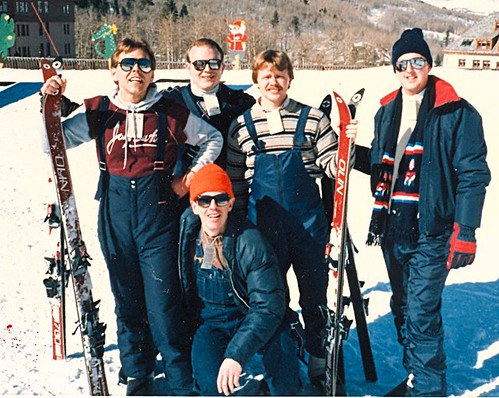An interesting analogy by Dave Winer:
“Previously it had been a sport that very few people enjoyed, and they were all very good. But now the doors are opening to amateurs. The pros have to share the slopes with people who don’t take the sport as seriously as they do. They’re still going to be able to ski, but the rest of us are not just going to admire them for how skilled they are, we’re going to do it too. They can earn a living as ski patrol and ski instructors. Or lift operators or more mundane jobs like people who work in hotels and drive the shuttle bus. There are still jobs in skiing after the arrival of the amateurs. But the exclusivity is gone.”
I think he might have nailed it. Oh, for the days before the lift lines were long and the slopes clogged with morons who didn’t know the right way to come down the hill.


One more thought… deleting tweets is pussy. I agree. And there is a penalty. Next time there’s some kind of breaking story… Mr. Kinder will have very little credibility. Like my sister-in-law and the Schwann’s man.
Okay, if you’re hanging your hat on the Jeff City not-a-hostage-situation example, I concede there was lots of rumor and misinformation on Twitter. But so what. Long before Twitter, people burned up the phone lines with gossip, rumor and bullshit. Most of us have a good feel for who we can trust. I gave much more credence to tweets from Chad Livengood and Tony Messenger (reporters) than I did somebody tweeting something their sister-in-law heard from the Schwann’s man.
But we’re getting far afield from my original post. Yes, there is –and always has been– bad information “out there.” On the web and before there was a web. The new reality is: anyone can report and publish. Is that good or bad? Depends on your perspective. But the ski slopes are now for everybody, including the bozos. Pull up your big boy ski pants and deal with it.
“CNN reported 10 shots had been fired, based on information it heard over the network’s police scanner.” What they didn’t know was the scanner chatter was simulated chatter, and they incorrectly reported it might be a terrorist attack. That was their mistake. And they put out a retraction. There were no shots fired in the building evacuation in Jeff City. And if memory serves me, all the “tweets” of the evacuation event and the previous several hours up to that point were removed from Kinder’s Twitter. No mea culpa, no statement of “oops.” If you’re putting it out there, stand behind what you write. If one gets it wrong, take responsibility for it, just like you do in your blog. You, Steve, always own up to it when you get it wrong.
So, when CNN erroneously reported “shots fired” (during a Coast Guard training exercise a month or so back), they were not “journalists.” Surely being right or wrong on a story isn’t the determinant of journalism. That can change from story to story.
I would never even consider prohibiting someone from doing something (unless it is harmful to others). Heck, their perspective might, indeed, create a paradigm shift in how news is covered. But most blogging, texting, what-have-you shouldn’t be considered “journalism” from a professional standpoint. You should consider Lt. Gov. Kinder’s “tweeting” of the building evacuation in Jeff City a few weeks ago. It was inaccurate, and it misinformed several people who followed it.
I remember seeing a press conference on the shootings at Virginia Tech a couple of years ago. Some people were allowed in the conference and asked questions. Their methods were to inject their personal opinion into what happened. That’s not news gathering. That’s commentary, and it slowed the process of getting information about the events from the people in the know .
Reply to Bass: But even people who don’t know how to ski should be allowed to snow plow down the slope, yes? Who know, they might get better.
And if you attend the city council meeting and blog about what took place, that’s okay too, right? Even if you “don’t know anything about writing in general, or journalism in particular.”
Just because more people are writing via internet or blog or what-have -you doesn’t mean they know anything about writing in general, or journalism in particular.